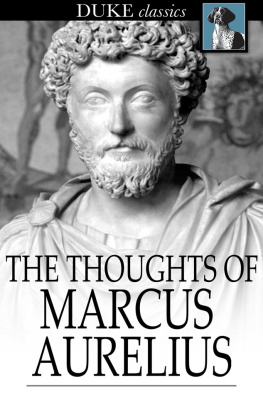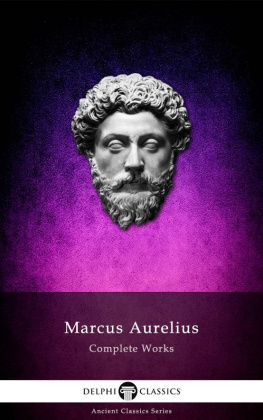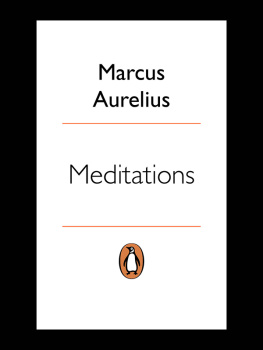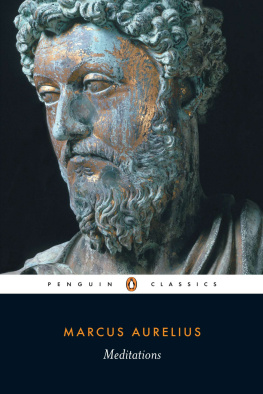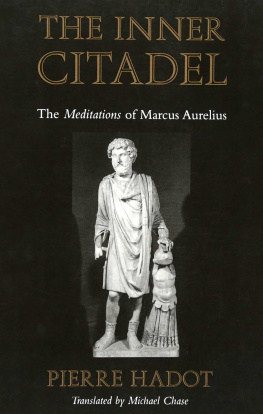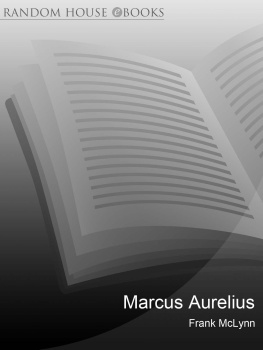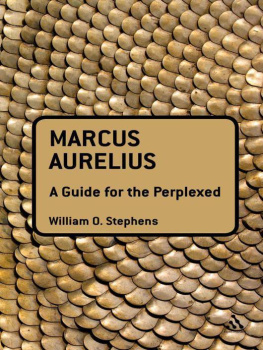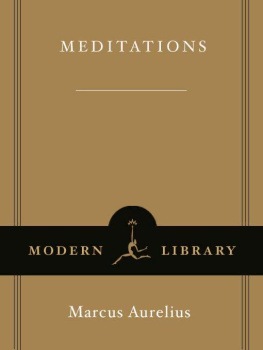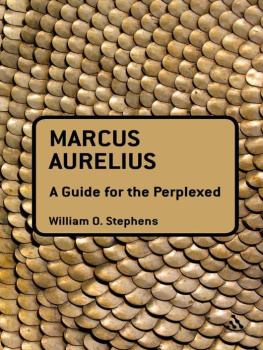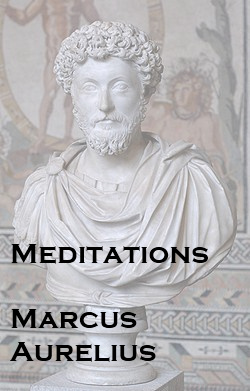Marcus Aurelius - The Thoughts of Marcus Aurelius
Here you can read online Marcus Aurelius - The Thoughts of Marcus Aurelius full text of the book (entire story) in english for free. Download pdf and epub, get meaning, cover and reviews about this ebook. year: 2012, publisher: Duke Classics, genre: Science. Description of the work, (preface) as well as reviews are available. Best literature library LitArk.com created for fans of good reading and offers a wide selection of genres:
Romance novel
Science fiction
Adventure
Detective
Science
History
Home and family
Prose
Art
Politics
Computer
Non-fiction
Religion
Business
Children
Humor
Choose a favorite category and find really read worthwhile books. Enjoy immersion in the world of imagination, feel the emotions of the characters or learn something new for yourself, make an fascinating discovery.
- Book:The Thoughts of Marcus Aurelius
- Author:
- Publisher:Duke Classics
- Genre:
- Year:2012
- Rating:4 / 5
- Favourites:Add to favourites
- Your mark:
- 80
- 1
- 2
- 3
- 4
- 5
The Thoughts of Marcus Aurelius: summary, description and annotation
We offer to read an annotation, description, summary or preface (depends on what the author of the book "The Thoughts of Marcus Aurelius" wrote himself). If you haven't found the necessary information about the book — write in the comments, we will try to find it.
In addition to the acclaim he garnered as a military leader and as Roman Emperor in the years 161 to 180, Marcus Aurelius Antoninus is regarded as one of the key figures in the philosophical school of thought known as Stoicism. This collection of essays and aphorisms offers a comprehensive introduction to Marcus Aurelius unique take on life and leadership.
The Thoughts of Marcus Aurelius — read online for free the complete book (whole text) full work
Below is the text of the book, divided by pages. System saving the place of the last page read, allows you to conveniently read the book "The Thoughts of Marcus Aurelius" online for free, without having to search again every time where you left off. Put a bookmark, and you can go to the page where you finished reading at any time.
Font size:
Interval:
Bookmark:

From an 1894 edition
ISBN 978-1-62011-975-4
Duke Classics
2012 Duke Classics and its licensors. All rights reserved.
While every effort has been used to ensure the accuracy and reliability of the information contained in this edition, Duke Classics does not assume liability or responsibility for any errors or omissions in this book. Duke Classics does not accept responsibility for loss suffered as a result of reliance upon the accuracy or currency of information contained in this book.
M. Antoninus was born at Rome, A.D. 121, on the 26th of April. Hisfather, Annius Verus, died while he was praetor. His mother was DomitiaCalvilla, also named Lucilla. The Emperor T. Antoninus Pius marriedAnnia Galeria Faustina, the sister of Annius Verus, and was consequentlythe uncle of M. Antoninus. When Hadrian adopted Antoninus Pius anddeclared him his successor in the empire, Antoninus Pius adopted both L.Ceionius Commodus, the son of Aelius Caesar, and M. Antoninus, whoseoriginal name was M. Annius Verus. Antoninus then took the name of M.Aelius Aurelius Verus, to which was added the title of Caesar in A.D.139: the name Aelius belonged to Hadrian's family, and Aurelius was thename of Antoninus Pius. When M. Antoninus became Augustus, he droppedthe name of Verus and took the name of Antoninus. Accordingly he isgenerally named M. Aurelius Antoninus, or simply M. Antoninus.
The youth was most carefully brought up. He thanks the gods (i. 17) thathe had good grandfathers, good parents, a good sister, good teachers,good associates, good kinsmen and friends, nearly everything good. Hehad the happy fortune to witness the example of his uncle and adoptivefather Antoninus Pius, and he has recorded in his word (i. 16; vi. 30)the virtues of the excellent man and prudent ruler. Like many youngRomans he tried his hand at poetry and studied rhetoric. Herodes Atticusand M. Cornelius Fronto were his teachers in eloquence. There are extantletters between Fronto and Marcus, which show the great affection ofthe pupil for the master, and the master's great hopes of hisindustrious pupil. M. Antoninus mentions Fronto (i. 11) among those towhom he was indebted for his education.
When he was eleven years old, he assumed the dress of philosophers,something plain and coarse, became a hard student, and lived a mostlaborious, abstemious life, even so far as to injure his health.Finally, he abandoned poetry and rhetoric for philosophy, and heattached himself to the sect of the Stoics. But he did not neglect thestudy of law, which was a useful preparation for the high place which hewas designed to fill. His teacher was L. Volusianus Maecianus, adistinguished jurist. We must suppose that he learned the Romandiscipline of arms, which was a necessary part of the education of a manwho afterwards led his troops to battle against a warlike race.
Antoninus has recorded in his first book the names of his teachers, andthe obligations which he owed to each of them. The way in which hespeaks of what he learned from them might seem to savor of vanity orself-praise, if we look carelessly at the way in which he has expressedhimself; but if any one draws this conclusion, he will be mistaken.Antoninus means to commemorate the merits of his several teachers, whatthey taught, and what a pupil might learn from them. Besides, this book,like the eleven other books, was for his own use; and if we may trustthe note at the end of the first book, it was written during one of M.Antoninus' campaigns against the Quadi, at a time when the commemorationof the virtues of his illustrious teachers might remind him of theirlessons and the practical uses which he might derive from them.
Among his teachers of philosophy was Sextus of Chaeroneia, a grandson ofPlutarch. What he learned from this excellent man is told by himself (i.9). His favorite teacher was Q. Junius Rusticus (i. 7), a philosopher,and also a man of practical good sense in public affairs. Rusticus wasthe adviser of Antoninus after he became emperor. Young men who aredestined for high places are not often fortunate in those who are aboutthem, their companions and teachers; and I do not know any example of ayoung prince having had an education which can be compared with that ofM. Antoninus. Such a body of teachers distinguished by theiracquirements and their character will hardly be collected again; and asto the pupil, we have not had one like him since.
Hadrian died in July A.D. 138, and was succeeded by Antoninus Pius. M.Antoninus married Faustina, his cousin, the daughter of Pius, probablyabout A.D. 146, for he had a daughter born in 147. He received from hisadoptive father the title of Caesar, and was associated with him in theadministration of the state. The father and the adopted son livedtogether in perfect friendship and confidence. Antoninus was a dutifulson, and the emperor Pius loved and esteemed him.
Antoninus Pius died in March, A.D. 161. The Senate, it is said, urged M.Antoninus to take the sole administration of the empire, but heassociated with himself the other adopted son of Pius, L. CeioniusCommodus, who is generally called L. Verus. Thus Rome for the first timehad two emperors. Verus was an indolent man of pleasure, and unworthy ofhis station. Antoninus however bore with him, and it is said Verus hadsense enough to pay to his colleague the respect due to his character. Avirtuous emperor and a loose partner lived together in peace, and theiralliance was strengthened by Antoninus giving to Verus for wife hisdaughter Lucilla.
The reign of Antoninus was first troubled by a Parthian war, in whichVerus was sent to command; but he did nothing, and the success that wasobtained by the Romans in Armenia and on the Euphrates and Tigris wasdue to his generals. This Parthian war ended in A.D. 165. Aurelius andVerus had a triumph (A.D. 166) for the victories in the East. Apestilence followed, which carried off great numbers in Rome and Italy,and spread to the west of Europe.
The north of Italy was also threatened by the rude people beyond theAlps, from the borders of Gallia to the eastern side of the Hadriatic.These barbarians attempted to break into Italy, as the Germanic nationshad attempted near three hundred years before; and the rest of the lifeof Antoninus, with some intervals, was employed in driving back theinvaders. In 169 Verus suddenly died, and Antoninus administered thestate alone.
During the German wars Antoninus resided for three years on the Danubeat Carnuntum. The Marcomanni were driven out of Pannonia and almostdestroyed in their retreat across the Danube; and in A.D. 174 theemperor gained a great victory over the Quadi.
In A.D. 175, Avidius Cassius, a brave and skilful Roman commander whowas at the head of the troops in Asia, revolted, and declared himselfAugustus. But Cassius was assassinated by some of his officers, and sothe rebellion came to an end. Antoninus showed his humanity by histreatment of the family and the partisans of Cassius; and his letter tothe Senate, in which he recommends mercy, is extant. (Vulcatius, AvidiusCassius, c. 12.)
Antoninus set out for the East on hearing of Cassius' revolt. Though heappears to have returned to Rome in A.D. 174, he went back to prosecutethe war against the Germans, and it is probable that he marched directto the East from the German war. His wife Faustina, who accompanied himinto Asia, died suddenly at the foot of the Taurus, to the great griefof her husband. Capitolinus, who has written the life of Antoninus, andalso Dion Cassius, accuses the empress of scandalous infidelity to herhusband, and of abominable lewdness. But Capitolinus says that Antoninuseither knew it not or pretended not to know it. Nothing is so common assuch malicious reports in all ages, and the history of imperial Rome isfull of them. Antoninus loved his wife, and he says that she was"obedient, affectionate, and simple." The same scandal had been spreadabout Faustina's mother, the wife of Antoninus Pius, and yet he too wasperfectly satisfied with his wife. Antoninus Pius says after her death,in a letter to Fronto, that he would rather have lived in exile with hiswife than in his palace at Rome without her. There are not many men whowould give their wives a better character than these two emperors.Capitolinus wrote in the time of Diocletian. He may have intended totell the truth, but he is a poor, feeble biographer. Dion Cassius, themost malignant of historians, always reports, and perhaps he believed,any scandal against anybody.
Font size:
Interval:
Bookmark:
Similar books «The Thoughts of Marcus Aurelius»
Look at similar books to The Thoughts of Marcus Aurelius. We have selected literature similar in name and meaning in the hope of providing readers with more options to find new, interesting, not yet read works.
Discussion, reviews of the book The Thoughts of Marcus Aurelius and just readers' own opinions. Leave your comments, write what you think about the work, its meaning or the main characters. Specify what exactly you liked and what you didn't like, and why you think so.

